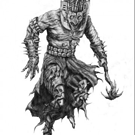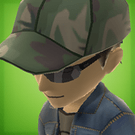Hi,
In my project, I need a soft stage curtain, so I ported github.com/nnkgw/verlet_cloth to Urho3D today.
I have optimized the performance for mobile device, on my iPad Mini Retina , CPU occupation statistics:
When disabled verlet cloth simulation:
Debug mode: 16%
Release mode: 16%
When enabled verlet cloth simulation:
Debug mode: 19%
Release mode: 17%
I use a ball to push the curtain to simulate wind, the curtain looks amazing.
Note that width = 11, height = 11, iteration = 2 are good for mobile device, the default values are good for desktop applications.
C++
Node* planeNode = scene_->CreateChild("VerletCloth");
planeNode->SetPosition(Vector3(0.0f, 2.6f, 20.0f));
planeNode->SetScale(Vector3(20.0f, 10.0f, 20.0f));
StaticModel* planeObject = planeNode->CreateComponent<StaticModel>();
planeObject->SetModel(new VerletCloth(context_, 11, 11, 2, false));
planeObject->SetMaterial(cache->GetResource<Material>("Materials/Curtain.xml"));
Material
<?xml version="1.0"?>
<material>
<technique name="Techniques/DiffUnlit.xml" quality="0" loddistance="0" />
<texture unit="diffuse" name="Textures/Background.jpg" />
</material>
VerletCloth.h
[code] #pragma once
#include <Urho3D/Urho3DAll.h>
/*
Port of
https://github.com/nnkgw/verlet_cloth
to Urho3D
*/
class CParticle{
private:
bool m_IsMovable;
Vector3 m_Position;
Vector3 m_OldPosition;
Vector3 m_Acceleration;
public:
CParticle(bool is_movable, Vector3& position, Vector3& acceleration) :
m_IsMovable(is_movable),
m_Position(position),
m_OldPosition(position),
m_Acceleration(acceleration){}
CParticle(){};
~CParticle(){}
inline void Update(float t){
if (m_IsMovable){
Vector3 tmp = m_Position;
m_Position += (m_Position - m_OldPosition) + m_Acceleration * t * t;
m_OldPosition = tmp;
}
}
inline Vector3& GetPosition() { return m_Position; }
inline void AddPosition(const Vector3 pos){
if (m_IsMovable){
m_Position += pos;
}
}
};
class CConstraint{
private:
float m_Distance;
CParticle* m_Particle1;
CParticle* m_Particle2;
public:
CConstraint(CParticle* p1, CParticle* p2) :
m_Distance(0.0f),
m_Particle1(p1),
m_Particle2(p2){
Vector3 p1_to_p2 = m_Particle2->GetPosition() - m_Particle1->GetPosition();
m_Distance = p1_to_p2.Length();
}
inline void Satisfy(){
Vector3 p1_to_p2 = m_Particle2->GetPosition() - m_Particle1->GetPosition();
float diff = p1_to_p2.Length() - m_Distance;
Vector3 correction_vector = p1_to_p2.Normalized() * diff * 0.5f;
m_Particle1->AddPosition( correction_vector);
m_Particle2->AddPosition(-correction_vector);
}
};
class CBall{
private:
float m_Frequency;
Vector3 m_Position;
float m_Radius;
float m_Offset;
public:
CBall(float radius) :
m_Frequency(0.0f),
m_Position(0.0f,0.0f,0.0f),
m_Radius(radius),
m_Offset(RandStandardNormal() * M_PI * 2.0f){}
inline void Update(float dt){
m_Position.z_ = 1.0f + cos(m_Frequency+m_Offset);
m_Frequency += dt * 0.2f;
if (m_Frequency > M_PI * 2.0f){ m_Frequency -= M_PI * 2.0f; }
}
Vector3& GetPosition(){ return m_Position; }
inline float GetRadius() { return m_Radius; }
};
class CCloth{
private:
int m_Width;
int m_Height;
PODVector m_Particles;
PODVector m_Constraints;
CParticle* GetParticle(int w, int h) {return &m_Particles[ h * m_Width + w ];}
void MakeConstraint(CParticle* p1, CParticle* p2) { m_Constraints.Push(CConstraint(p1, p2));}
public:
CCloth(float width, float height, int num_width, int num_height):
m_Width(num_width),
m_Height(num_height) {
m_Particles.Resize(m_Width * m_Height);
for(int w = 0; w < m_Width; w++){
for(int h = 0; h < m_Height; h++){
Vector3 pos( width * ((float)w/(float)(m_Width - 1) ) - width * 0.5f,
-height * ((float)h/(float)(m_Height - 1)) + height * 0.5f,
0.0f );
bool is_movable = (h == 0) ? false : true;
Vector3 gravity( 0.0f, -0.98f, 0.0f );
m_Particles[ h * m_Width + w ] = CParticle(is_movable, pos, gravity);
}
}
for(int w = 0; w < m_Width; w++){
for(int h = 0; h < m_Height; h++){ // structual constraint
if (w < m_Width - 1){ MakeConstraint(GetParticle(w, h), GetParticle(w+1, h )); }
if (h < m_Height - 1){ MakeConstraint(GetParticle(w, h), GetParticle(w, h+1)); }
if (w < m_Width - 1 && h < m_Height - 1){ // shear constraint
MakeConstraint(GetParticle(w, h), GetParticle(w+1, h+1));
MakeConstraint(GetParticle(w+1, h), GetParticle(w, h+1));
}
}
}
for(int w = 0; w < m_Width; w++){
for(int h = 0; h < m_Height; h++){ // bend constraint
if (w < m_Width - 2){ MakeConstraint(GetParticle(w, h), GetParticle(w+2, h )); }
if (h < m_Height - 2){ MakeConstraint(GetParticle(w, h), GetParticle(w, h+2)); }
if (w < m_Width - 2 && h < m_Height - 2){
MakeConstraint(GetParticle(w, h), GetParticle(w+2, h+2));
MakeConstraint(GetParticle(w+2, h), GetParticle(w, h+2));
}
}
}
}
~CCloth(){}
inline Vector3& GetPosition(int w, int h) { return m_Particles[ h * m_Width + w ].GetPosition(); }
void Update(float dt, CBall* ball, int iteration){
PODVector<CParticle>::Iterator particle;
for(particle = m_Particles.Begin(); particle != m_Particles.End(); particle++){
(*particle).Update(dt);
}
for(int i = 0; i < iteration; i++){
for(particle = m_Particles.Begin(); particle != m_Particles.End(); particle++){
Vector3 vec = (*particle).GetPosition() - ball->GetPosition();
float length = vec.Length();
float radius = ball->GetRadius() * 1.4f; // fake radius
if (length < radius) {
(*particle).AddPosition(vec.Normalized() * (radius - length));
}
}
PODVector<CConstraint>::Iterator constraint;
for(constraint = m_Constraints.Begin(); constraint != m_Constraints.End(); constraint++){
(*constraint).Satisfy();
}
}
}
};
/// Custom logic component for rotating a scene node.
class VerletCloth : public Model
{
URHO3D_OBJECT(VerletCloth, Model);
public:
/// Construct.
VerletCloth(Context* context, int width = 21, int height = 21, int iteration = 5, bool updateNormal = false) :
Model(context),
width_(width),
height_(height),
iteration_(iteration),
updateNormal_(updateNormal),
cloth_(nullptr),
ball_(nullptr),
buffer_(nullptr)
{
cloth_ = new CCloth(1.0f, 1.0f, width_, height_);
ball_ = new CBall(0.05f);
CreateScratchModel();
buffer_ = GetGeometry(0, 0)->GetVertexBuffer(0);
// Subscribe HandleUpdate() function for processing update events
SubscribeToEvent(E_UPDATE, URHO3D_HANDLER(VerletCloth, HandleUpdate));
}
virtual ~VerletCloth()
{
if (cloth_) {
delete cloth_;
cloth_ = nullptr;
}
if (ball_) {
delete ball_;
ball_ = nullptr;
}
buffer_ = nullptr;
}
void HandleUpdate(StringHash eventType, VariantMap& eventData)
{
using namespace Update;
// Take the frame time step, which is stored as a float
float timeStep = 0.0333333333f;//eventData[P_TIMESTEP].GetFloat();
cloth_->Update(timeStep, ball_, iteration_);
ball_->Update(timeStep);
float* vertexData = (float*)buffer_->Lock(0, buffer_->GetVertexCount());
if (vertexData)
{
// Update vertices
for (int w=0; w<width_; w++) {
for (int h=0; h<height_; h++) {
Vector3& src = cloth_->GetPosition(w, h);
Vector3& dest = *reinterpret_cast<Vector3*>(vertexData + (h * width_ + w) * 8);
dest = src;
}
}
// Update normals
if (updateNormal_) {
for (int w=0; w<width_; w++) {
for (int h=0; h<height_; h++) {
Vector3 n1, n2, n3, n4, n5, n6;
// Detect surrounding triangles
if (w-1>0 && h-1>0) {
Vector3& v1 = *reinterpret_cast<Vector3*>(vertexData + (h * width_ + w - 1) * 8);
Vector3& v2 = *reinterpret_cast<Vector3*>(vertexData + ((h - 1) * width_ + w - 1) * 8);
Vector3& v3 = *reinterpret_cast<Vector3*>(vertexData + (h * width_ + w) * 8);
n1 = (v2 - v1).CrossProduct(v3 - v2).Normalized();
}
if (w-1>0 && h-1>0) {
Vector3& v1 = *reinterpret_cast<Vector3*>(vertexData + ((h - 1) * width_ + w - 1) * 8);
Vector3& v2 = *reinterpret_cast<Vector3*>(vertexData + ((h - 1) * width_ + w) * 8);
Vector3& v3 = *reinterpret_cast<Vector3*>(vertexData + (h * width_ + w) * 8);
n2 = (v2 - v1).CrossProduct(v3 - v2).Normalized();
}
if (w+1<width_ && h-1>0) {
Vector3& v1 = *reinterpret_cast<Vector3*>(vertexData + ((h - 1) * width_ + w) * 8);
Vector3& v2 = *reinterpret_cast<Vector3*>(vertexData + (h * width_ + w + 1) * 8);
Vector3& v3 = *reinterpret_cast<Vector3*>(vertexData + (h * width_ + w) * 8);
n3 = (v2 - v1).CrossProduct(v3 - v2).Normalized();
}
if (w+1<width_ && h+1<height_) {
Vector3& v1 = *reinterpret_cast<Vector3*>(vertexData + (h * width_ + w + 1) * 8);
Vector3& v2 = *reinterpret_cast<Vector3*>(vertexData + ((h + 1) * width_ + w + 1) * 8);
Vector3& v3 = *reinterpret_cast<Vector3*>(vertexData + (h * width_ + w) * 8);
n4 = (v2 - v1).CrossProduct(v3 - v2).Normalized();
}
if (w+1<width_ && h+1<height_) {
Vector3& v1 = *reinterpret_cast<Vector3*>(vertexData + ((h + 1) * width_ + w + 1) * 8);
Vector3& v2 = *reinterpret_cast<Vector3*>(vertexData + ((h + 1) * width_ + w) * 8);
Vector3& v3 = *reinterpret_cast<Vector3*>(vertexData + (h * width_ + w) * 8);
n5 = (v2 - v1).CrossProduct(v3 - v2).Normalized();
}
if (w-1>0 && h+1<height_) {
Vector3& v1 = *reinterpret_cast<Vector3*>(vertexData + ((h + 1) * width_ + w) * 8);
Vector3& v2 = *reinterpret_cast<Vector3*>(vertexData + (h * width_ + w - 1) * 8);
Vector3& v3 = *reinterpret_cast<Vector3*>(vertexData + (h * width_ + w) * 8);
n6 = (v2 - v1).CrossProduct(v3 - v2).Normalized();
}
Vector3& n = *reinterpret_cast<Vector3*>(vertexData + (h * width_ + w) * 8 + 3);
// Average surrounding normals
n = (n1 + n2 + n3 + n4 + n5 + n6).Normalized();
}
}
}
buffer_->Unlock();
}
}
private:
void CreateScratchModel()
{
const unsigned numVertices = width_ * height_;
const unsigned numIndices = (width_-1) * (height_-1) * 6;
float* vertexData = new float[numVertices * 8];
memset(vertexData, 0, numVertices * 8 * sizeof(float));
// Fill vertex buffer
for (int w=0; w<width_; w++) {
for (int h=0; h<height_; h++) {
// Vertex
vertexData[(h * width_ + w) * 8 ] = (float)w / (float)(width_ - 1) - 0.5f;
vertexData[(h * width_ + w) * 8 + 1] = -(float)h / (float)(height_ - 1) + 0.5f;
vertexData[(h * width_ + w) * 8 + 2] = 0.0f;
// Normal
vertexData[(h * width_ + w) * 8 + 3] = 0.0f;
vertexData[(h * width_ + w) * 8 + 4] = 0.0f;
vertexData[(h * width_ + w) * 8 + 5] = -1.0f;
// UV
vertexData[(h * width_ + w) * 8 + 6] = (float)w / (float)(width_ - 1);
vertexData[(h * width_ + w) * 8 + 7] = (float)h / (float)(height_ - 1);
}
}
unsigned short* indexData = new unsigned short[numIndices];
memset(indexData, 0, numIndices * sizeof(unsigned short));
// Fill index buffer
for (int w=0; w<width_-1; w++) {
for (int h=0; h<height_-1; h++) {
// Triangle one, clockwise order.
indexData[(h * (width_ - 1) + w) * 6 ] = h * width_ + w;
indexData[(h * (width_ - 1) + w) * 6 + 1] = h * width_ + w + 1;
indexData[(h * (width_ - 1) + w) * 6 + 2] = (h + 1) * width_ + w + 1;
// Triangle two, clockwise order.
indexData[(h * (width_ - 1) + w) * 6 + 3] = h * width_ + w;
indexData[(h * (width_ - 1) + w) * 6 + 4] = (h + 1) * width_ + w + 1;
indexData[(h * (width_ - 1) + w) * 6 + 5] = (h + 1) * width_ + w;
}
}
SharedPtr<VertexBuffer> vb(new VertexBuffer(context_));
SharedPtr<IndexBuffer> ib(new IndexBuffer(context_));
SharedPtr<Geometry> geom(new Geometry(context_));
// Shadowed buffer needed for raycasts to work, and so that data can be automatically restored on device loss
vb->SetShadowed(true);
// We could use the "legacy" element bitmask to define elements for more compact code, but let's demonstrate
// defining the vertex elements explicitly to allow any element types and order
PODVector<VertexElement> elements;
elements.Push(VertexElement(TYPE_VECTOR3, SEM_POSITION));
elements.Push(VertexElement(TYPE_VECTOR3, SEM_NORMAL));
elements.Push(VertexElement(TYPE_VECTOR2, SEM_TEXCOORD));
vb->SetSize(numVertices, elements);
vb->SetData(vertexData);
ib->SetShadowed(true);
ib->SetSize(numIndices, false);
ib->SetData(indexData);
geom->SetVertexBuffer(0, vb);
geom->SetIndexBuffer(ib);
geom->SetDrawRange(TRIANGLE_LIST, 0, numIndices);
SetNumGeometries(1);
SetGeometry(0, 0, geom);
SetBoundingBox(BoundingBox(Vector3(-0.5f, -0.5f, 0.0f), Vector3(0.5f, 0.5f, 0.0f)));
delete [] vertexData;
delete [] indexData;
}
int width_;
int height_;
int iteration_;
bool updateNormal_;
CCloth* cloth_;
CBall* ball_;
VertexBuffer* buffer_;
};
[/code]



